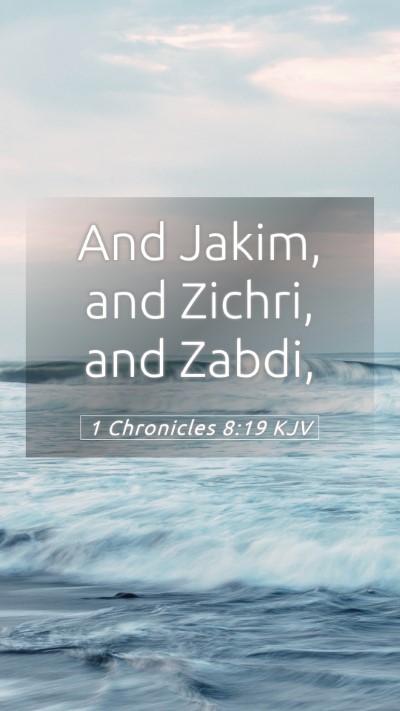Bible Verse Meaning of 1 Chronicles 8:19
This passage, 1 Chronicles 8:19, offers a glimpse into the genealogical records of the tribe of Benjamin, highlighting key figures and their lineage. Understanding this verse requires diving deeper into the historical context and relationships within the families mentioned. Below, we will explore the meanings, interpretations, and explanations as gathered from public domain commentaries by Matthew Henry, Albert Barnes, and Adam Clarke.
Verse Context
The verse states: "The sons of Eliezer were: Rehabiah the chief; and Eliezer had no other sons; but the sons of Rehabiah were very many." This genealogy of the tribe of Benjamin emphasizes the importance of lineage and heritage in Israelite culture, showcasing the significance of Eliezer's descendants.
Insights from Commentaries
-
Matthew Henry
Henry notes that the listing of Eliezer's sons and their descendants reflects the broader theme of God's faithfulness in preserving His covenant people. The fact that Eliezer had no other sons yet had a large number of descendants through Rehabiah indicates divine blessing. It portrays how God's promises are realized even through what may seem limited or unlikely.
-
Albert Barnes
Barnes comments on the importance of the genealogy in establishing the rightful heritage and the continuation of priestly duties within the families. The multitude of Rehabiah's sons suggests thriving leadership and spiritual gifts, emphasizing that God's favor can lead to significant outcomes from a seemingly small beginning.
-
Adam Clarke
Clarke further emphasizes the historical context of 1 Chronicles as a work aimed at restoring proper worship and organization in post-exilic Judah. He asserts that understanding these genealogies is crucial for grasping the identity and structure of the community and acknowledges that such records serve to encourage present and future generations regarding their heritage and responsibilities.
Theological Significance
The genealogical information provided in 1 Chronicles 8:19 holds multiple layers of theological significance:
- Divine Providence: The lineage showcases God's providential care. Despite Eliezer having no other sons, the continuation through Rehabiah speaks to a plan beyond immediate visibility.
- Community Identity: Genealogies in the Bible often highlight the identity of the people of Israel as a chosen nation, with a collective history and purpose.
- Importance of Leadership: The number of Rehabiah's descendants indicates the importance of leadership roles within the community, signifying the blessings of God on those dedicated to Him.
Application of the Verse
For modern-day readers seeking to apply the teachings of this verse:
- Understanding Your Heritage: Acknowledge and explore your own spiritual heritage and how it shapes your identity and faith journey.
- The Impact of Faithful Living: Consider how living faithfully to God can yield lasting influence and blessing, affecting generations to come.
- Role of Leadership: Reflect on the qualities of leadership demonstrated by figures like Rehabiah and strive to embody those in your spiritual and community life.
Related Cross References
- 1 Chronicles 9:3 - Lists the inhabitants of Jerusalem and their genealogies.
- Exodus 6:23 - Highlights the lineage of Aaron and Moses, reinforcing the importance of heritage.
- Matthew 1:1-17 - New Testament genealogy showing Jesus' lineage, revealing the unfolding of God's redemptive plan.
Conclusion
In summary, 1 Chronicles 8:19 serves as more than a mere genealogical record; it is a profound testament to God's sovereignty, the significance of ancestry, and the promise of blessings through faithful generations. Engaging with this verse through thoughtful interpretation enhances understanding of Scripture and reveals God's ongoing work through His people.


